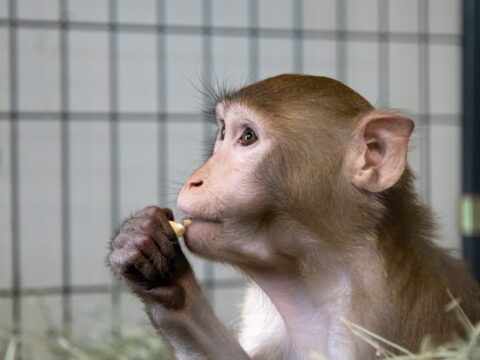Investigation
Why Rodeos Are Still Popular When Marine Parks and the Circus Are Declining
Justice•9 min read
Perspective
Many humans assume that sharing a home with a cute baby monkey will be endlessly fun. But in practice, owning an exotic animal proves detrimental for both the "pet" and the humans involved.


Words by Tim Ajax
Inside an R.V. at McGee Creek State Park in southern Oklahoma, events were unfolding quickly. A four-year-old monkey had turned on his “owner” when she tried to put him back into the wire dog kennel used to confine him. An outburst of anger by Louie, as the young rhesus macaque was called, frightened the woman and her partner. They decided that the monkey had to go.
The woman contacted the Oklahoma Primate Sanctuary (OPS) in Newcastle, formerly Mindy’s Memory Primate Sanctuary. At OPS, 80 monkeys live in compassionate lifetime care, retired from laboratory research or, like Louie, rescued from the traumas of being held as pets. As OPS would soon discover, the traumas that Louie had experienced were severe.
OPS staff member Jennifer Draiss drove six hours round-trip to the state park to respond to Louie’s urgent need for help. At the park, she found an anxious young monkey spinning relentlessly in his small crate, a diaper duct-taped to his bottom, and a leather dog collar cinched around his waist. The “owner” told her that she had bought Louie from a private breeder in Texas at the tender age of two days.
In the wild, rhesus macaque babies spend most of their first six months of life clinging near-constantly to their mothers. From their mothers, they learn what to eat, to whom to show deference, and dangers to avoid. Louie had the benefit of his mother’s love for only 48 hours, a miserable and inadequate beginning for any monkey.
Louie’s canine teeth had been filed down to make it easier for his owners to interact with him. He was obviously nervous and upset. Yet only after Draiss arrived back in Newcastle with Louie, and after the sanctuary team had assessed him properly, did the full extent of his condition become clear.
Using blunted garden shears, OPS staff gently removed the dog collar and loosened the tape on the diaper so that Louie could remove that item himself. Louie explored his new home—just a temporary enclosure on that day—and quickly discovered a bucket of water. Wonderful as it was to see Louie splash and play, it was clear from his gait that something was wrong. X-rays later confirmed that Louie had dislocated his left elbow and broken his right shoulder and collarbone. These injuries were not recent. His little body had healed around the trauma as best it could, but the damage was done; his mobility is forever impaired.
The larger tragedy is that Louie’s experience is far from uncommon. OPS is also home to Patty, an aging patas monkey who had her teeth removed and tail amputated—to make it easier to place diapers on her. Then there’s Danny Girl, who arrived emaciated and near death; she was heavily parasitized and could barely eat due to chronic pain from a botched dental procedure two years earlier. Little Kendi, now a happy and rambunctious African green monkey, was roughly handled and forced to endure unnatural routines at only weeks old; Kendi was blatantly exploited for ad revenue on a YouTube channel. Every primate sanctuary in the U.S. has stories similar to these to share.
According to the North American Primate Sanctuary Alliance (NAPSA), many thousands of monkeys and even apes live in private homes throughout the United States. “Hard data on the number of privately owned primates currently living in the U.S. is unavailable,” NAPSA Program Director Erika Fleury notes, “because most of these ‘pets’ are undocumented, living in backyards and back rooms all across America.”
How did such a harmful practice become so popular? Because baby monkeys are cute, some humans mistakenly believe that sharing a home with one would be endlessly fun. The media publishes cozy images of celebrities with their “pet” monkeys, but the reality of “owning” a monkey is inevitably different: a life of stress for all involved. Monkeys are wild animals, meant to live in groups in which fast-moving social dynamics governing friendships and rivalries give their sophisticated brains a daily workout. Life as a pet is so unnatural, and so limiting, for these monkeys that they inevitably act out negatively in some way, just as Louie did. Monkeys bite, and when they “become too unmanageable to handle,” as NAPSA puts it, humans face a substantial risk of bodily injury.
The future is bright for Louie. Despite a rough start in life, his spirit is marvelously intact. Louie does not seem to notice his physical handicaps; he plays with all the exuberance of youth. Already he has interacted with Poindexter, an older male monkey retired from research. This spring, OPS will introduce him to other new monkey friends.
Primates—and other exotic wildlife “pets”—should not have to rely on urgent rescue missions to meet their basic needs. The practice of keeping monkeys like Louie as pets is outdated and cruel. Monkeys are sensitive, intelligent, energetic creatures—not pets.